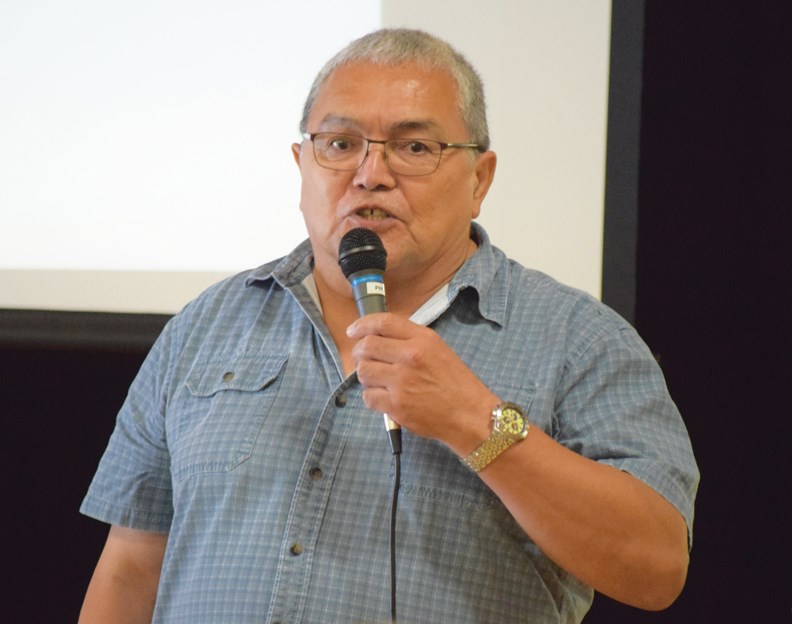Powell River-Sunshine Coast MLA Nicholas Simons says he sees “light at the end” after an update from provincial officials on the controversial Pender Harbour Dock Management Plan (DMP).
Simons made the comments as part of an update for the nearly 150 residents who packed the Madeira Park Community Hall Sept. 10 for a Pender Harbour Advisory Council town hall.
Simons was accompanied by shíshálh Nation Chief Warren Paull, who acknowledged that the DMP has been “a bone of contention,” and got a round of applause with a commitment to resolve the outstanding issues.
“I know there are questions with regards to the Pender Harbour Dock Management Plan which have raised blood pressures. I’m here to tell you that the shíshálh Nation wants to work together with everyone. We’re not going to get everything we want, and not everybody else is going to get everything they want. But somewhere in there, there’s middle ground, and we look forward to finding that with you,” said Paull.
The outcry over a draft version of the DMP in 2015 led the province to put it on hold and bring in former B.C. attorney general Barry Penner to listen to concerns from the community and the shíshálh Nation.
Penner’s report, which came out in early 2016, made 13 recommendations.
In response, the government announced it would delay implementation of the DMP for “up to a year” to allow for environmental and archeological studies. A moratorium on new dock permits continues, though, and one member of the audience said the moratorium is also preventing him from making much-needed repairs to an existing dock.
Simons told the town hall crowd that action is finally being taken on Penner’s recommendation.
“Contracts have [now] been awarded to two companies to undertake those studies. Those two reports, I understand, will be completed by early next year and I think that’s a positive step,” Simons said.
“I think we have an opportunity to see this particular issue as not so much a problem, but something we can work towards reconciling and dealing with community-to-community,” he continued. “I’m hopeful about the relationship that will evolve from this point.”
Simons also said he’d be willing to meet soon with the Dock Management Plan Working Group that was established shortly after the draft plan’s release.
The conciliatory tone of the meeting was briefly disrupted during a Q&A session when someone demanded to know how the DMP could go forward without dealing with the status of the Indigenous people in the Pender Harbour area who want recognition as the Pender Harbour Indian Band.
Paull said the shíshálh Nation is still trying to get clarification from federal and provincial authorities, and for now talks between the two groups are at an impasse after disagreements over how a court hearing was handled.
“There’s been a lot of animosity … a lot of negativity from both sides of the fence,” Paull said. “That is not the way forward.”
The update on another long-simmering issue in Pender Harbour was handled by Sunshine Coast Regional District (SCRD) director Frank Mauro, who talked about derelict and abandoned vessels.
As well as representing Area A at the SCRD board, Mauro is chair of the Harbour Authority and a member of the Pacific Region Harbour Authority Advisory Committee.
Mauro described the situation as a case of “local government being saddled with the consequences of these problems [while] they are the only ones without any jurisdiction whatsoever.”
He cited several examples from around Pender Harbour, noting the various agencies responsible for enforcement which, depending on the circumstances, could include any combination of the local Harbour Authority, provincial ministries of Forests, Lands and Natural Resources or Environment, as well as the federal ministries of Transportation or Fisheries and Oceans.
“Everyone should work together to simplify the really complex regulatory regime,” Mauro said.
The deadline to apply for recently announced federal money for assessment and removal of problem vessels is coming up at the end of October, and Mauro said he’d like to see the Pender Harbour area get some of the $5.6 million over five years. But, he said the Harbour Authority is limited to derelict or abandoned vessels at its docks, and the SCRD can’t do it on its own because it doesn’t have a service to administer the funds through.
Mauro said, instead, the SCRD is looking for groups willing to take on the work, and apply to the federal government for funding under the new programs and to the SCRD for grants-in-aid.
“I would look favourably to approving that kind of a grant-in-aid. It’s very important for us,” he said.



